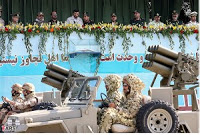 |
| Iranian military parade (Credit: FARS) |
Madison Ruppert, Contributing Writer
Activist Post
Just like Iraq, it begins with diplomatic and economic sanctions and open threats which eventually snowball into military action.
One can only hope that all of this saber rattling coming from Israel, the United States and the United Kingdom will not evolve into real military strikes.
However, the sweeping sanctions approved by the Foreign Affairs Committee of the House of Representatives on Wednesday in the United States will still significantly damage Iran and its people if they are enacted.
While the sanctions that targeted the Iranian central bank and those who trade with Iran are now being reconsidered according to U.S. officials, the push from Israel might be able to force the hand of America even though it would harm our national interests.
Yet despite all of the posturing, there truly is no evidence that Iran is a threat to the West.
Even the Israeli news agency Haaretz has to point out this fact in writing, “Intelligence services now say it will take Iran two or three years to get the bomb once it decides to (it hasn’t made the decision yet).”
The most dangerous aspect of these types of sweeping sanctions is that the damage is not immediately apparent to the outside world and especially the West which has its information spoon-fed to it by highly biased corporate news sources.
For instance, the sanctions against Iraq which began in August of 1990, just four days after the Iraqi invasion of Kuwait, resulted in the deaths of an estimated 500,000 dead Iraqis, most of them children according to British MP George Galloway.
However, the Iraqi Baathist government estimated that 1.5 million died as a result of the sanctions and former U.S. Attorney General Ramsey Clark estimated a total of 1.5 million died from sanctions, bombs and other weapons and depleted uranium (DU) poisoning.
It is clear that the damage from sanctions are not readily apparent, and they usually do not end up harming those who they are intended to target in the government, but instead end up harming regular people who have no impact on governmental operations or policies.
An article recently published by AntiWar reveals just how far-reaching these sanctions are and how damaging they could be for the people of Iran.
Some of these sanctions were radically unrealistic and harsh and as the president of the National Foreign Trade Council, Bill Reinsch pointed out, they “fly in the face of facts on the ground, the demonstrable failure of previous sanctions to achieve their stated purpose, and the basic rules of diplomacy among nations”.
Thankfully, it now appears that the U.S. is backing away from the sanctions which would target the Iranian central bank over concerns that it would negatively impact the already fragile international oil market.
That being said, U.S. officials are now saying that they will opt instead to seek to coerce Iran’s major trading allies to join the United States in enforcing the sanctions that are already in place.
In addition, they are also reporting that the U.S. will create some more narrowly focused sanctions against Iran according to Paul Richter of the Los Angeles Times.
Meanwhile, across the pond, Britain and Israel seem to be gearing up for all-out war with Iran.
For the first time since 2008, Israel tested the Jericho 3, an intercontinental ballistic missile capable of carrying nuclear warhead long distances on Wednesday.
Israeli Prime Minister, Benjamin Netanyahu, has been reportedly trying to push what little opposition he has within his cabinet into getting behind an attack on Iran with the help of Defense Minister Ehud Barak.
In response to the Jericho 3 test, which was a clear instance of antagonizing Iran at an all-too-inopportune time, Barak said it was an “impressive technological achievement”.
In another suspiciously timed event, Israel released the details of an air force exercise done in concert with Italy, using a NATO base, over the Mediterranean Sea which simulated a long-distance strike, much like what would be utilized against Iran.
American President Barack Obama also said that he had spoken with French President Nicolas Sarkozy and they both had come to the conclusion “that international pressure must be maintained on Iran” according to Israeli news agency Haaretz.
 A major factor in this push towards significant action against Iran is the International Atomic Energy Agency (IAEA) report due next week.
A major factor in this push towards significant action against Iran is the International Atomic Energy Agency (IAEA) report due next week.
This report will allegedly show if Iran is meeting its “international obligations” in its nuclear ambitions, although one might argue that this report could be highly biased given it is coming from a United Nations body.
Some American politicians are not being as coy as others, sticking to the typical diplomatic language in dealing with Iran.
Rick Perry, a former Bilderberg Group attendee, Republican Presidential hopeful, and current Governor of Texas, has openly said he would support attacks on Iran.
“Obviously, we are going to support Israel. And I’ve said that we will support Israel in every way that we can, whether it’s diplomatic, whether it’s economic sanctions, whether it’s overt or covert operations, up to and including military action,” Perry said in an interview on CNN.
This kind of blind support for Israel is what plagues American politics today. Even when such a move could result in the death of Americans and/or a significant negative economic impact, politicians like Perry will happily back Israel to the detriment of our own nation.
The support within Israel for a strike on Iran is quite considerable as well, with a Dialog Polling Institute poll showing that 41% of those polled backed an Israeli attack on Iranian nuclear facilities. However, 39% of those polled oppose such an attack while 20% were undecided on the matter.
The margin of error was 4.6% and only 495 people were polled so one must consider the small sample size in giving credence to the figure. Dialog claims that their random sampling represents Israeli adults, but the numbers are far from conclusive at this stage.
Despite the split in the Israeli public, the support for an attack on Iran amongst the Israeli cabinet does not seem so divided.
Haaretz reports that Israel’s Foreign Minister, Avigdor Lieberman, previously did not support an attack on Iran, but was recently persuaded by Prime Minister Netanyahu and Defense Minister Barak to get behind the move.
The Israeli Strategic Affairs Minister, Moshe Ya’alon, reportedly said that he would prefer an American military strike against Iran to an Israeli one.
Why would we have any interest in attacking Iran? In reality, Iran is not a threat to the United States, but the Israel Lobby likely could easily sway Washington into carrying out the strike for Israel, putting American lives and money on the line instead of their own.
Similarly, Dan Meridor, the Israeli Intelligence and Atomic Energy Minister said that he supports an American offensive against Iran.
The London Guardian has reported that Britain is developing military plans for an attack on Iran in preparation for the IAEA report which has been characterized as “a game changer”.
“The MoD [Ministry of Defense] says there are no hard and fast blueprints for conflict but insiders concede that preparations there and at the Foreign Office have been under way for some time”, according to The Guardian.
This dovetails with the reports of Obama planning to increase the American presence in the Persian Gulf, as I previously reported.
It appears that the contingency plans have been in the works for some time and they are seemingly being implemented as I write this.
However, some are speculating that all of this public talk and open threats are just a covert push to pressure the international community into taking a hard line against Iran.
 For instance, the former director of the Jaffee Center for Strategic Studies, Yossi Alpher, said that the discussion of air strikes against Iran “might be more to do with persuading the international community to tighten sanctions, which have so far proved ineffective, after the IAEA report is published next week”, according to The Week.
For instance, the former director of the Jaffee Center for Strategic Studies, Yossi Alpher, said that the discussion of air strikes against Iran “might be more to do with persuading the international community to tighten sanctions, which have so far proved ineffective, after the IAEA report is published next week”, according to The Week.
Meanwhile, in Iran, the reaction has been one of marked antagonism with the Iranian Foreign Minister Ali Akbar Salehi saying that Iran is “ready for war” with Israel.
Salehi told the Turkish news outlet Hürriyet Daily, “We have been hearing threats from Israel for eight years. Our nation is a united nation…such threats are not new to us”.
Salehi also said that any attack would bring retaliation and Iranian General Hassan Firouzabadi said that Israel and the U.S. would be harshly punished for an attack in Iran.
“We would make them regret such a mistake and would severely punish them,” Firouzabadi said, adding, “In case of an attack by the Zionist regime, the United States would also be hit”.
The head of the Iranian Supreme National Security Council, Saeed Jalili, will reportedly detail the proof of U.S.-led terrorist plots against Iran at a ceremony marking the anniversary of the 1979 U.S. Embassy hostage crisis in Tehran.
This evidence is allegedly so damning that it could bring the U.S. government down according to an Iranian lawmaker and Deputy Chairman of the Majilis Committee on National Security and Foreign Policy, Hossein Ebrahimi.
“Once Tehran publicizes the evidence in its possession on the US being a terrorist [state] and [Washington’s] massacres, the American nation would certainly unite to topple their [ruling] regime”, Ebrahimi reportedly said.
Furthermore, in late September the head of the Iranian Navy, Rear Admiral Habibollah Sayyari, threatened to send military ships off the Atlantic Coast of the United States.
The tensions are rising and the rhetoric is heated from all sides. All we can do at this point is gather information and hope the worst doesn’t occur. We will keep you updated as information emerges. If you have any tips or articles to send our way, please do not hesitate to contact us at [email protected]
linkwithin_text=’Related Articles:’


Be the first to comment on "The Western assault on Iran has begun"